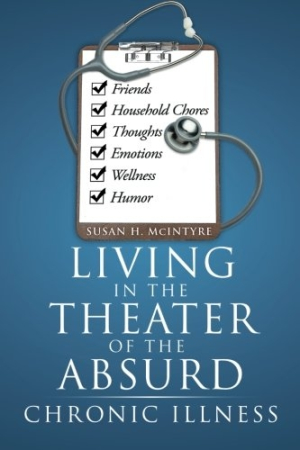Living in the Theater of the Absurd
Chronic Illness
Susan H. McIntyre lives with some eighteen chronic illnesses. And she does so with good humor and grace, as displayed in Living in the Theater of the Absurd. Her inclination to share what she’s learned about her illnesses and how she copes with the medical, physical, and emotional aspects of them seems to stem from a genuine and generous interest in assisting other sufferers of chronic illness.
She combines unequal measures of pragmatic advice, tips, and tested ideas, and she mixes them with a brand of humor that veers from the mild and gentle to the absurd. A joke about a “vortex” into which things constantly get lost in the author’s home, is amusing in an early chapter; but it becomes tiresome and silly when it is repeated every few pages throughout the book. McIntyre calls her maladies “monsters” and she also has gremlins and monster siblings and cousins, too—a cute idea for an essay but perhaps not for a book. The construct does work on an emotional level, but wears thin fast.
However, the author’s organizational structure, conversational tone, and light touch triumphs over her book’s flaws. Each short chapter is focused on how a person with chronic illnesses can cope with one particular issue and incorporate its limitations into daily activities. Though she’s prone to generalization, McIntyre offers plenty of good advice, concluding each chapter with a short, simple list of lessons learned.
In the chapter “Family Relationships,” for example, McIntyre’s notes that, “If one person is ill, the entire family is affected…Family members need guidance in knowing how to help…Laugh together at the absurdities life brings.” On getting things done despite physical challenges, she offers these nuggets at the end of her chapter on “Errands”: “Know your stamina limit and plan and prioritize around it…Know what store services are available…Make your monsters visible by using accessories.” By the latter she means carrying a cane, wearing a brace, or using the handicapped motorized grocery cart so that others don’t become frustrated with your slow pace in parking lots, store aisles, and checkout lines.
McIntyre has a lot to offer, and her cheerful attitude and dogged determination are palpable. However, her efforts would have been better served had she written either a straightforward advice guide or a humorous rant. Nonetheless, her quick-reading book will no doubt be a boon to many who are less able than the author to find a way around and through the real challenges of chronic illness.
Reviewed by
Lisa Romeo
Disclosure: This article is not an endorsement, but a review. The publisher of this book provided free copies of the book and paid a small fee to have their book reviewed by a professional reviewer. Foreword Reviews and Clarion Reviews make no guarantee that the publisher will receive a positive review. Foreword Magazine, Inc. is disclosing this in accordance with the Federal Trade Commission’s 16 CFR, Part 255.

